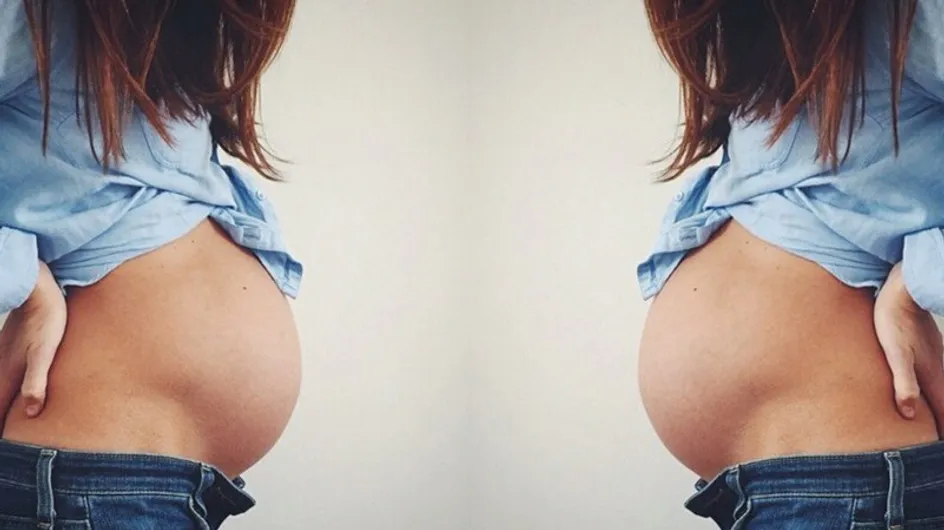The nine months of pregnancy can be some of the most stressful of woman's life. We worry about our unborn babies all.the.time. Which is why it's so great that we get to see a midwife regularly, who can tell us the status, sex and health of our unborn children. But what exactly is involved with these check ups? We spoke to Alison Edwards, Senior Lecturer in Midwifery at Birmingham City University, who gave us a little background info on what you can expect from your antenatal check ups:
"First time mothers will have up to 10 visits and subsequent pregnancies around 8 visits. The first two or three will involve scans, history taking and blood tests. Visits after that will always have a check on their overall wellbeing, an examination of the abdomen and measurements and also blood pressure and urine check. Towards the end of the pregnancy the midwife will meet the woman to discuss preparing for the birth and for infant feeding.
At term the midwife will discuss induction and maybe perform something called a sweep which involves an internal examination which can kick start labour. Some meetings will clearly be with doctors and or midwives dependant on their risk status."
Your first consultation
After going crazy with joy over your new pregnancy, one of the first things you'll do is see your midwife or doctor ASAP to start the referral process. The first check-up should take place ideally by the twelfth week of pregnancy. It will be your longest antenatal appointment because your midwife will ask lots of questions and provide you with lots of information - which is cool because you'll get to talk non-stop about your pregnancy!
Your midwife will calculate the date of conception and ask questions about your health and medical history, as well as that of your family so the midwife can determine if there's anything that could affect your pregnancy, such as allergies or genetic conditions. They will also give you plenty of info and tips on relevant lifestyle or diet changes. You may also be offered an ultrasound scan there and then if your midwife is based at the local hospital. This scan measures the size of your baby (which will probably resemble a kidney bean at the moment) and gives a more accurate estimate of your due date.
You will also have your weight, height and blood pressure measured. Several blood tests will allow the midwife to check your blood group (A, B, AB or O), Rhesus status (positive or negative), iron levels, and rubella or german measles status.
You will also be screened for HIV, syphilis and hepatitis B (unless you specifically opt not to), and you may be asked if you want your baby to be screened for Down’s syndrome, spina bifida, and hemoglobinopathies - for example, sickle cell or thalassemia. Analysis of your urine will allow the midwife to check for the presence of albumin and sugar, and to detect any risk of diabetes, infections or kidney problems.
Regular check-ups
After your first big appointment, you'll be seen every four to six weeks until you near the end of your pregnancy (then you’ll be seen every week or so). If you’re expecting your first child you may have additional appointments (at 25, 31 and 40 weeks). It can vary from person to person, so your midwife will be able to tell you when you're going to need appointments.
8-14 weeks
This will be when your midwife will give you what's known as the 'dating scan'. This scan will help to determine when you're baby's due, and will also just check on the physical development of your baby.
16 weeks
During this appointment, your midwife will go over the results of the blood and urine tests from your first appointment. She’ll check your blood pressure and test your urine again (spoiler: this is gonna happen at every appointment). Use these opportunities with your midwife to ask questions about your pregnancy and talk through anything that’s worrying you. Your midwife will be your baby guru for the next nine months, so use these appointments wisely to discuss things like antenatal classes and where you can have your baby.
18-20 weeks
Along with the routine checks, if you’ve decided to have a screening to check for anomalies, this is when the screening will take place. If the scan detects that your placenta is blocking the entrance to your cervix, you’ll have another scan at 36 weeks to check whether it has moved out of the way.
28 weeks
In addition to the routine checks, the midwife will start to measure your bump at each appointment so she can check your baby is growing properly. If you’re Rhesus negative, you will be offered what is known as an 'Anti-D' injection, which coats any foetal blood cells that may have leaked into your circulation. This will reduce the chances of your body producing antibodies that may attack foetal cells, which could cause problems for your unborn baby. Your midwife will also take another lot of blood samples from you in order to check for antibodies, and to ensure that your iron levels are sufficient.
34 weeks
Not long to go! Along with the routine checks and bump measurements, your midwife will discuss with you the blood results that you had taken at 28 weeks. If your iron levels are low then you may need supplements to boost the levels before your baby's birth.
36 weeks
On top of the routine checks, if you have had a scan taken the midwife will discuss the results from this with you in order to check the position of the placenta. She will also check your baby’s position by feeling your bump with her hands. If your baby is breech (positioned feet first), the midwife may offer you a procedure called an external cephalic version (ECV) to try and turn the baby around manually. This will be performed by the consultant in the hospital, and will attempt to gently manipulate your baby into the head down position. If the anomalies scan you may have had at 18-20 weeks shows that your placenta was blocking the entrance to your cervix, you will have another scan now to see if it has moved out of the way.
Sadly, your time with your baby guru will be coming to an end soon, so if you have a birth plan, this is a good time to discuss it with your midwife. You may want to consider how you wish to feed your baby and whether or not you want your baby to have Vitamin K following birth.
38 weeks
Unless you're a first timer, this will be your final appointment before the big event. Your midwife will test your blood pressure and urine, and will measure your bump one last time. Although you may have a few weeks left, your midwife may discuss with you at this appointment options for induction of labour should your baby not arrive on time. Normally your baby will be born around the 40 week mark, but it is not uncommon for the gestation of a human infant to be anywhere between 37-42 weeks of pregnancy. So be prepared!
One final thought...
Don’t forget that there’s nothing stopping you from speaking to a midwife in between appointments if you have a concern. Your midwife is there for you to ask questions, no matter how silly. If your midwife hasn’t already given you a 24-hour contact number, ask her for one. Just promise to try and keep the 3am 'random thought' questions to a minimum!
Want to know more about your antenatal check ups? Tweet us! @sofeminineUK
You might also like...
10 Reactions People Have When You Tell Them You're Preggo



















